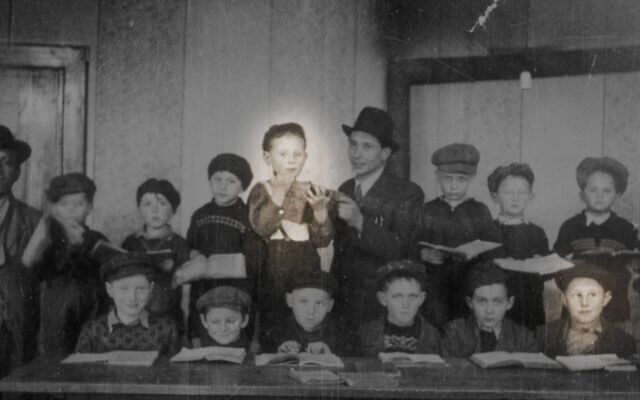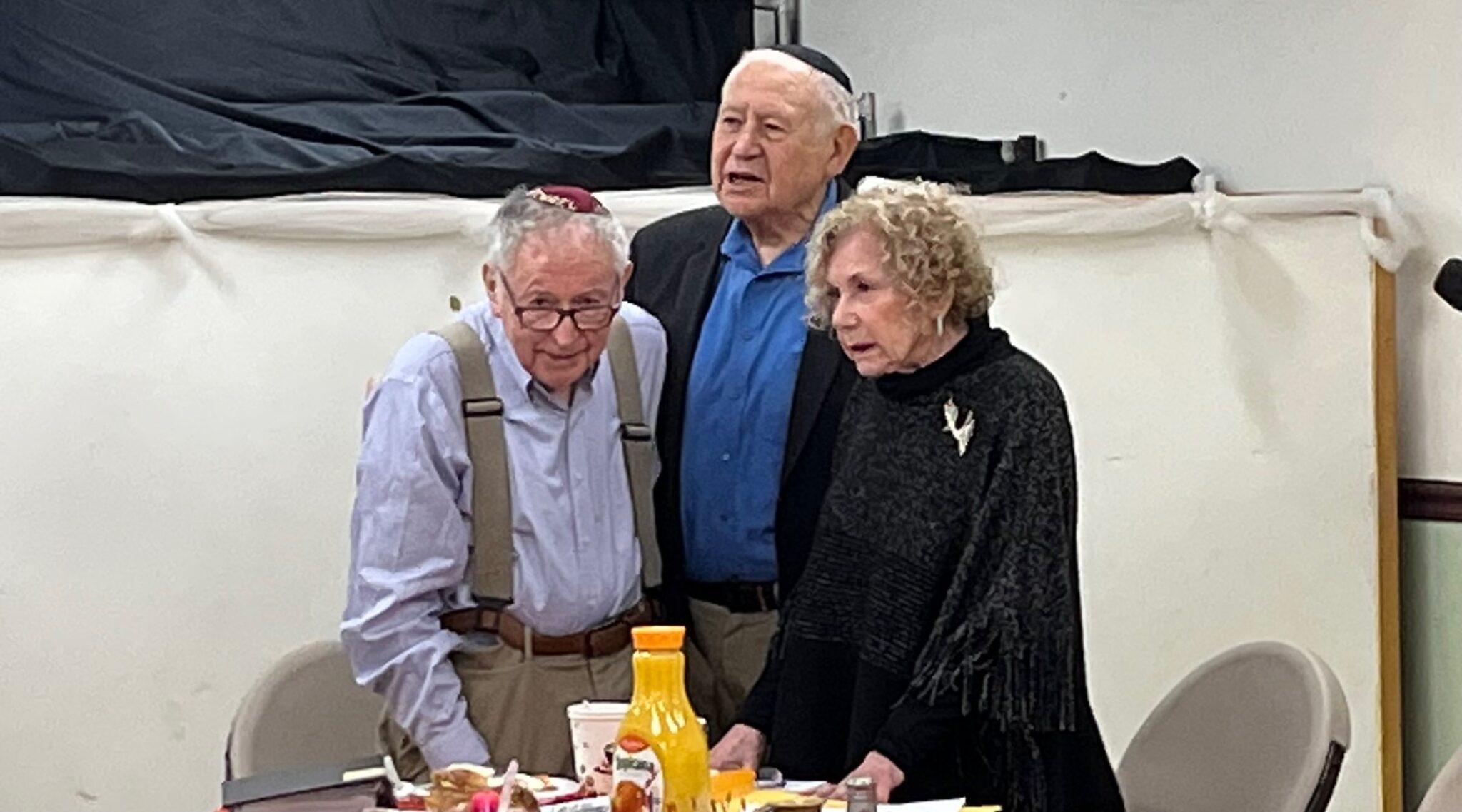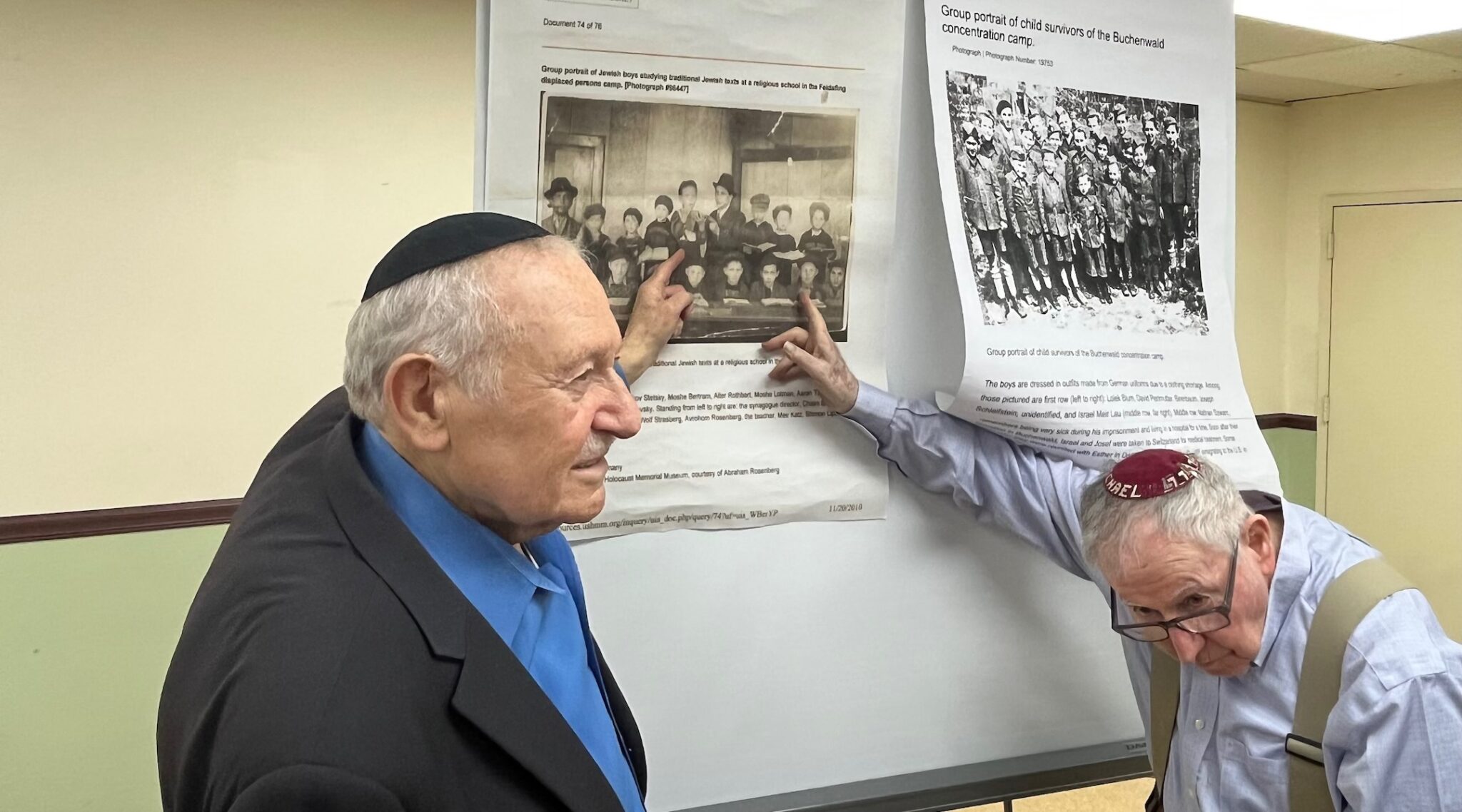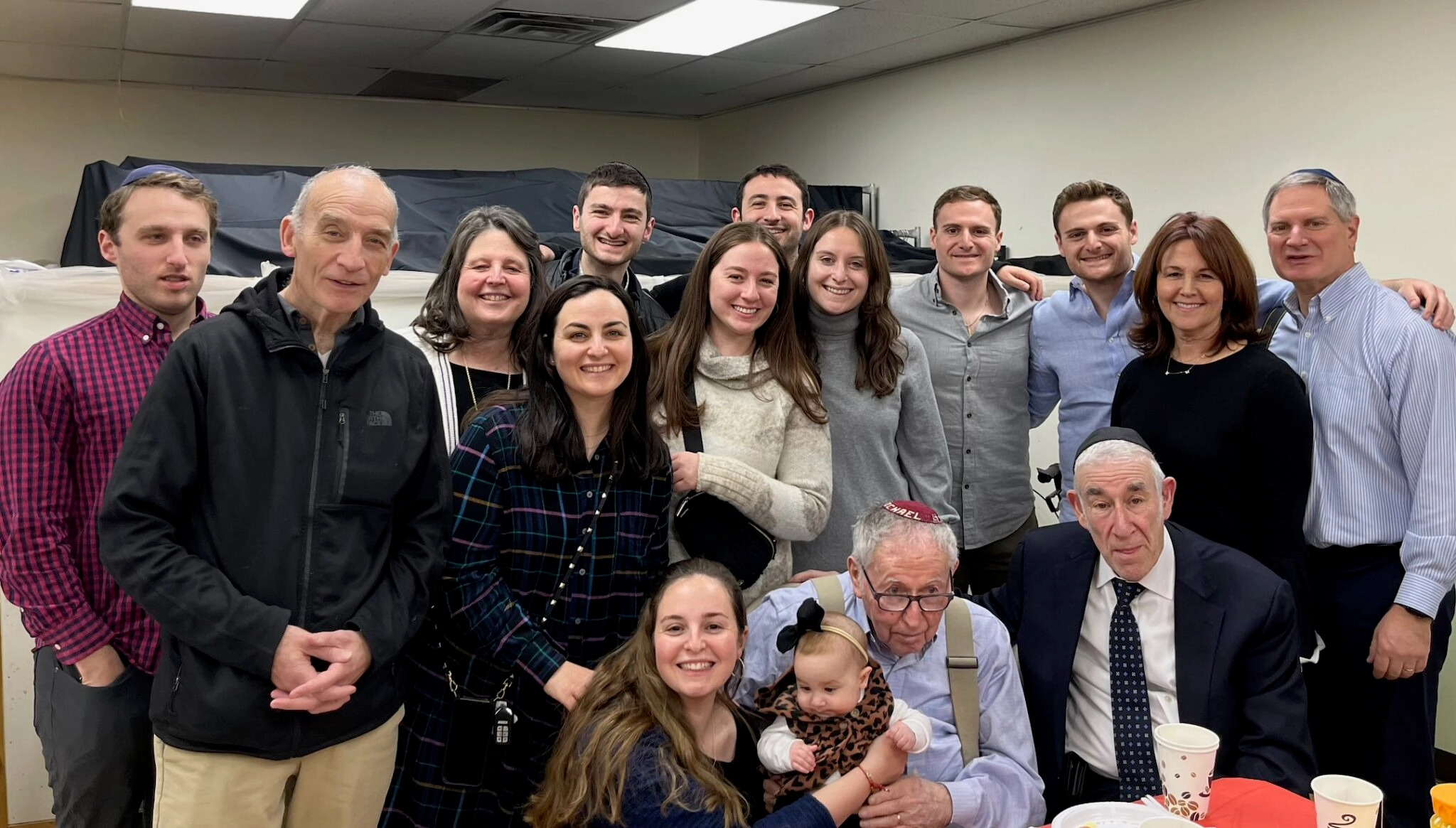Holocaust survivors and former classmates reunited after 76 years
Michael Epstein, 87, and Abe Rosenberg, 82, embrace at emotional reunion in New York.

The last time Michael Epstein, 87, and Abe Rosenberg, 82, were in the same room, they were in Germany, studying in a classroom in a displaced person’s (DP) camp in Bavaria after the Holocaust.
On Sunday the two men — along with Abe’s older sister, Ada Gracin, who was also in the camp — reunited after 76 years.
This time it was in the social hall of Young Israel of New Hyde Park, New York, where the pair embraced, said the Shehecheyanu prayer to mark their reunion and shared their survival stories with an audience of 100.
The reunion came together quickly, just a few weeks after the two men learned they lived less than 40 miles from one another — Rosenberg on the eastern border of Queens, and Epstein in Jersey.
Originally intended to be an intimate meeting between the two families, the reunion soon broadened to a festive brunch and celebration open to the public.

“The Torah says it’s a mitzvah to relate what happened to us,” Rosenberg said. “Hitler’s goal was to destroy Yiddishkeit, Judaism. When we gather here, we are involved in a victory over him.”
The two were brought together by a sharp-eyed videographer. In February, Epstein participated in an interview at a Jewish day school in Edison, New Jersey as part of the “Names Not Numbers” oral history project, which is dedicated to preserving the memories of Holocaust survivors and ensuring their legacies live on in future generations. As part of the project, high school students interview survivors about their experiences, which are filmed and made into mini-documentaries.
During the interview, Epstein presented a photograph of himself as a 7-year-old in “cheder” or elementary school at Feldafing, an all-Jewish displaced person’s camp near Munich, where he lived from 1945 to 1949.
As it happens, the videographer that day recognised the photograph. He had seen the same one during an interview he had filmed the prior year with another survivor — Rosenberg — who was living in Queens. When Epstein and his two daughters learned this, they knew they had to arrange a meeting.
“This is the first time I know of a reunion happening between survivors as a result of our programme,” Daniel Mayer, a Names Not Numbers board member, told the New York Jewish Week.
As for Rosenberg, when he got the call from Epstein, “it just concretised the fact that the whole experience [of Feldafing] wasn’t a dream,” he said.

Though the two men did not specifically remember each other — Rosenberg was 8 and Epstein and Gracin were 11 at the time of the picture, taken in 1947 — at the event, they acutely recalled their lives at the DP camp.
Rosenberg, for example, remembers living in Barrack Nine with his sister and parents. During the war, the Nazis used Feldafing as a training ground for Hitler Youth. In Feldafing, like at other Jewish DP camps, survivors waiting for a country that would taken them in opened Jewish schools, started newspapers, composed music and began to rebuild their identities.
“We were hoping to go to Palestine, to Eretz Yisroel — that was our dream,” Rosenberg said. “It was not available to us” under the British Mandate. “Unfortunately, the doors of the whole world were closed to us.”
“So what did we do?” he continued. “We started to build on Jewish life again.”

On Sunday, as the assembled crowd noshed on bagels, lox and egg salad — and other participants joined via Zoom from California, Florida, New Jersey and Canada — Epstein, Rosenberg and Gracin shared their experiences with those in attendance.
First to speak was Epstein, who brought with him a scrapbook of pictures from his childhood. Epstein was born in Łódź, Poland, in 1935, which his family was forced to flee when Germany invaded in 1939. They went to Bialystok, which soon fell under the control of the Russians, who transported Poles and Jews to labor camps in Siberia via cattle cars. After spending time at a gulag camp in Siberia, Epstein and his family were moved to another in Uzbekistan.
When the war ended, Epstein and his parents returned to Łódź, only to find that their entire extended family had been killed and a Polish family was living in their apartment. With nothing left for them in Poland, they left for Feldafing. They lived there until they could find a way to get to the United States, where they eventually arrived in 1945.
Epstein, who is known as Zayde to his 11 grandchildren and 5 great-grandchildren — many of whom were in the room — left the crowd with a message to invest in Jewish education, and to work to uphold democracy. “We live in ‘di Goldene Medine’ (the Golden Land),” he said. “We thought, in Europe, that meant there was gold on the street. There’s no gold on the street but there is gold on paper in our Constitution, and in our Constitution there is still mining to do. There is still work to be done to make our Constitution’s morals realistic.”
Rosenberg and Gracin, who spoke next, were also from Łódź. Gracin, born Ada Rosen in 1935, recalled wearing the mandated yellow Jewish star patch on her clothing as a 4-year-old. Her mother was pregnant with her brother when they left Poland for Soviet Georgia, a journey she said was “fraught with peril,” as they were stopped multiple times by the Gestapo. The family lived in Georgia for six years and “fear was a constant.”
When the war ended, the family also returned to Łódź to look for surviving family members — there were none. They connected with the Jewish Agency and HIAS, which helped them get to Feldafing in 1945.
There, “we were referred to as ‘she’arit hapletah,’ the surviving remnants,” Gracin said. “I refer to this period in my life as ‘life reborn,’ as I lost my childhood prior to this. Although we lacked many things, I never felt deprived. The survivors cherished each child as if it were their own. We were precious jewels to them, as they had lost their own children.”
“For the first time in my life, I went to school, made friends, played and laughed,” she added. “I was a happy 9 year old.”
Gracin, her brother and her parents arrived in New York Harbour on April 6, 1949. “At last we were free of fear, free to live and practice our religion and thrive,” she said. “I feel blessed to have been given this chapter in my life and my revenge to Hitler is that I was blessed with three children and six grandchildren.” Two of Gracin’s children and four of her grandchildren were at the event.
In his remarks, Rosenberg recalled the heroism of the parents, teachers and rabbis in Feldafing, many of whom had lost their entire families but made it their mission to educate the few children who made it to the camp. “They were the heroes,” Rosenberg said. “They deserve the accolades — we were kids.” It is in their honor and memory that Rosenberg continued to share his story throughout his life, he said.
Though Epstein and Rosenberg did not stay in touch upon their respective arrivals to the United States, their lives continued to follow similar paths. Both went on to study engineering at the City College of New York and for a time both worked at Bendix Corporation, though in different departments — Epstein in the space programme and Rosenberg on the supersonic transport team.

Thank you for helping to make Jewish News the leading source of news and opinion for the UK Jewish community. Today we're asking for your invaluable help to continue putting our community first in everything we do.
For as little as £5 a month you can help sustain the vital work we do in celebrating and standing up for Jewish life in Britain.
Jewish News holds our community together and keeps us connected. Like a synagogue, it’s where people turn to feel part of something bigger. It also proudly shows the rest of Britain the vibrancy and rich culture of modern Jewish life.
You can make a quick and easy one-off or monthly contribution of £5, £10, £20 or any other sum you’re comfortable with.
100% of your donation will help us continue celebrating our community, in all its dynamic diversity...
Engaging
Being a community platform means so much more than producing a newspaper and website. One of our proudest roles is media partnering with our invaluable charities to amplify the outstanding work they do to help us all.
Celebrating
There’s no shortage of oys in the world but Jewish News takes every opportunity to celebrate the joys too, through projects like Night of Heroes, 40 Under 40 and other compelling countdowns that make the community kvell with pride.
Pioneering
In the first collaboration between media outlets from different faiths, Jewish News worked with British Muslim TV and Church Times to produce a list of young activists leading the way on interfaith understanding.
Campaigning
Royal Mail issued a stamp honouring Holocaust hero Sir Nicholas Winton after a Jewish News campaign attracted more than 100,000 backers. Jewish Newsalso produces special editions of the paper highlighting pressing issues including mental health and Holocaust remembrance.
Easy access
In an age when news is readily accessible, Jewish News provides high-quality content free online and offline, removing any financial barriers to connecting people.
Voice of our community to wider society
The Jewish News team regularly appears on TV, radio and on the pages of the national press to comment on stories about the Jewish community. Easy access to the paper on the streets of London also means Jewish News provides an invaluable window into the community for the country at large.
We hope you agree all this is worth preserving.





















